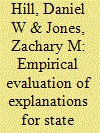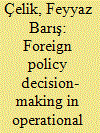| Srl | Item |
| 1 |
ID:
133949


|
|
|
|
|
| Publication |
2014.
|
| Summary/Abstract |
The empirical literature that examines cross-national patterns of state repression seeks to discover a set of political, economic, and social conditions that are consistently associated with government violations of human rights. Null hypothesis significance testing is the most common way of examining the relationship between repression and concepts of interest, but we argue that it is inadequate for this goal, and has produced potentially misleading results. To remedy this deficiency in the literature we use cross-validation and random forests to determine the predictive power of measures of concepts the literature identifies as important causes of repression. We find that few of these measures are able to substantially improve the predictive power of statistical models of repression. Further, the most studied concept in the literature, democratic political institutions, predicts certain kinds of repression much more accurately than others. We argue that this is due to conceptual and operational overlap between democracy and certain kinds of state repression. Finally, we argue that the impressive performance of certain features of domestic legal systems, as well as some economic and demographic factors, justifies a stronger focus on these concepts in future studies of repression.
|
|
|
|
|
|
|
|
|
|
|
|
|
|
|
|
| 2 |
ID:
175457


|
|
|
|
|
| Summary/Abstract |
Traditionally seen as an interlocutor between Europe and the US in transatlantic security relations, the UK’s engagement with the training of the Afghan National Police (ANP) through the concurrent EU and NATO missions presents an interesting case of foreign policy decision-making. Although a logic based on broader British orientations about the roles of the two organisations expect that the UK’s primary institution of choice would be NATO, London supported both missions in providing international policing assistance to Afghanistan. Adopting an operational overlap perspective, this article seeks to explain the UK’s strategic behaviour vis-a-vis the EU and NATO training missions that have been simultaneously involved in overlapping tasks, despite the initial intention that the two missions would undertake different and complementary roles. Analysing evidence from the UK Parliament and Government, US diplomatic missions, the EU and NATO, as well as interviews with former UK and NATO officials, this article argues that while providing training to the Afghan police, London focused on these missions’ practical outputs rather than preferring an organisation of choice as such. This strategy is mainly guided by the UK’s concern to uphold counter-narcotics enforcement in Afghanistan and to fulfil transition tasks during the incremental withdrawal of British troops.
|
|
|
|
|
|
|
|
|
|
|
|
|
|
|
|